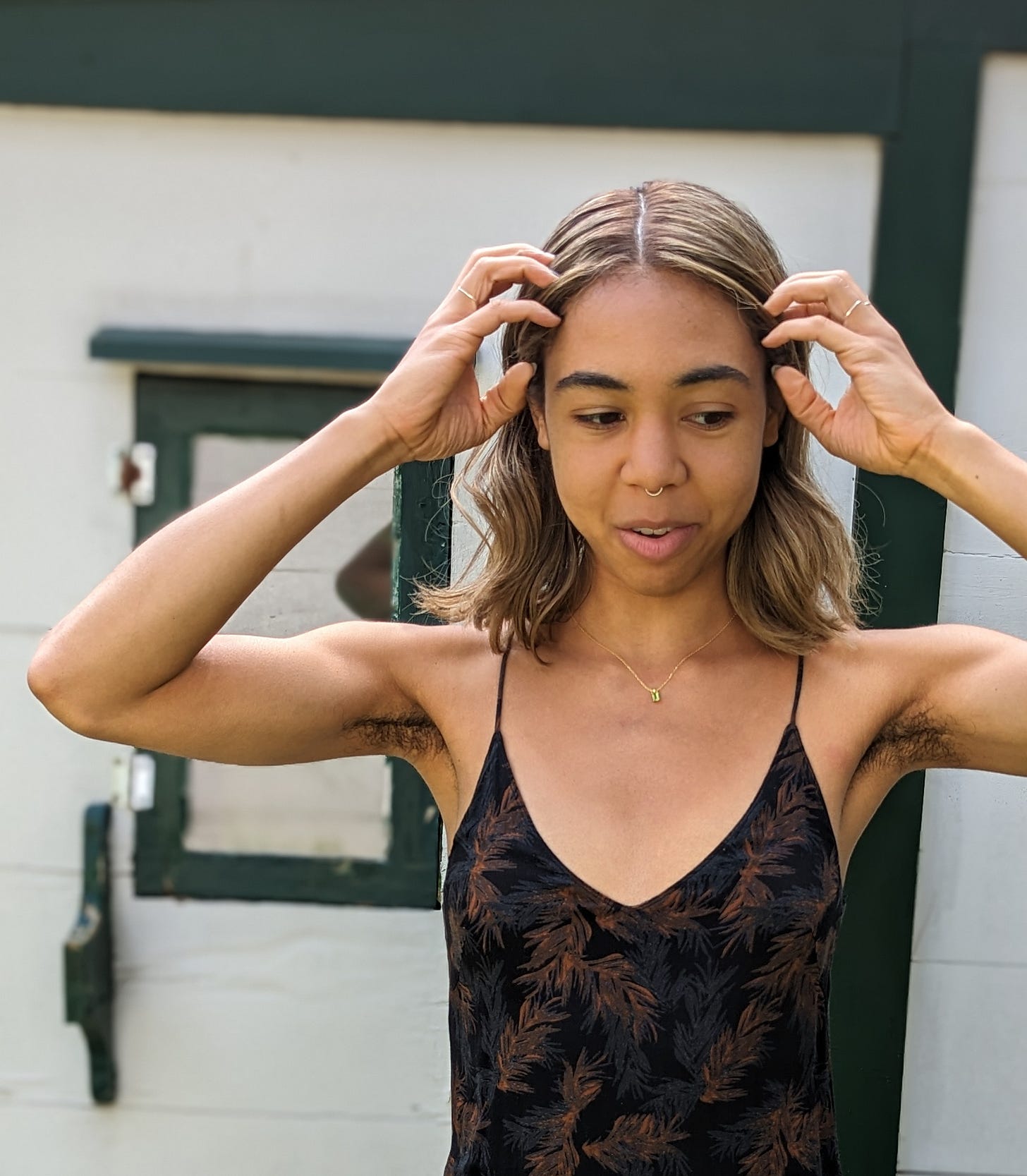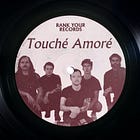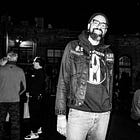An Interview with Mariah Stovall
The author of 'I Love You So Much It's Killing Us Both' talks about the pros and cons of peppering a novel with niche punk references.
Hello and welcome to ZERO CRED (formerly REPLY ALT), the world’s only music newsletter. Subscriptions are free, but you can also upgrade to a paid subscription for just a couple bucks a month which helps me greatly. It also gets you my weekly book column and other fun stuff.
I’m going hold a giveaway for a copy of today’s book, I Love You So Much It's Killing Us Both, for my paid subscribers after the interview. Oh and what the hell I will throw in a signed copy of my book SELLOUT too. So get subscribing!
A few weeks ago, I tried to recommend some romantic books about music for Valentine’s Day but came up shorter than expected. The crossover between the genres was surprisingly thin. Is being in love and having feelings… unpunk?? Coincidentally, a few days later, a new book was released that looked like it would fill the gap.
At its heart, Mariah Stovall’s debut novel, I Love You So Much It’s Killing Us Both, is about the undefinable space between two people, stuck somewhere between love and friendship. But the backdrop of this coming-of-age story becomes its own distinct presence. It’s set against the early 2010s punk and emo scene, and there are enough niche music references to fill a Kallax (IKEA, please sponsor me). I have sort of lost the ability to discern what is and isn’t “niche” to general literary audiences these days, but I’ve got to assume the average reader would not get a Comadre reference. Or Loma Prieta. Or Dikembe. Or Glocca Mora. But this is the edge on which I Love You So Much It’s Killing Us Both (the title itself taken, of course, from a Jawbreaker song) rides.
I talked to Mariah Stovall about appealing to a very specific audience (me), her path from literary agent to author, and the wonderfully unprofitable world of book publishing.
Did you always know that you wanted music to be a big presence in this book? What was your initial vision for it?
Mariah Stovall: I guess now it’s quite debatable whether I’m a writer or not. I don’t necessarily see myself that way. This book is the first thing that I ever wrote, really. I wrote it because it was mid- to late-2015 and I was out of college and had been working for a couple of months. I worked, and still work, in publishing. I was working in a place where I wasn’t super excited about the books that were coming in and I was like, “Well, what is my dream book that I would want to read?” Basically, I just wanted to put this musical time period that’s covered in the book into fiction, because I didn’t know if anyone else was doing it. And at some point while I was writing it, I saw that you were writing about these things from a nonfiction angle. I wondered what the historical record around this time period was gonna be. That’s where it started.
It’s funny, a friend of mine was trying to shop a book around that was a history of this scene that you write about, this sort of 2010s punk—Rosenstock and AJJ and Dillinger 4—but the feedback that he got from publishers was that it was too niche. I feel like you found the loophole in that you wrote a fictional book about it.
Yeah. [Laughs]
Can you tell me how it was shopping this book idea around to publishers?
How was it? It was the worst. [Laughs] I was very much caught between two places. From working in publishing, I had some insight into how things worked and what was the most desirable type of book at the time, but then I also was very much like, “I should just be able to write however I want, whatever I want.” Trying to reconcile those two things was difficult. Even getting an agent was hard. I had this spreadsheet, and this sounds very crazy, but it was over, like, 200 agents who said no. Some of them liked the pitch but I think when they actually read it, they wanted a more straightforward type of book. I was getting notes like, “Less music stuff. We don't need so much of that.” I think that the book’s idea of a female friendship story was intriguing to a lot of people in publishing, or a Black character in mostly white spaces. I think those things, on paper, were of interest. But then as soon as people read it they were just like, no. And I will say: I was learning how to write as I did this. So I think part of it was just that I wasn’t ready in that way. But getting an agent was a struggle, and then I did get an agent who’s really wonderful and believed in the book for longer than I did. She sent it out for two years, I think, before we finally got interest in the version of it that I wanted to write.
And you are a literary agent yourself and have also worked for publishers. Do you find yourself empathizing more with your authors now that you’ve gone through the publishing process yourself?
Yeah. I think I’ve always been on the author’s side. I could talk for so long about how dumb publishing is and the way it works. It just doesn’t make any sense and if I think about it too much I get really angry and want to leave. But yes, I definitely feel for authors and always try to just explain things to them and encourage them to ask me questions if they’re confused about something. I think people have very strong ideas of what it’s like to publish a book but they’re usually off-base, which is not their fault.
Yeah. One thing that I don’t think first-time authors realize is how much of an uphill battle publishing a book can be. I feel like one of the biggest roles of an agent is just expectation management. Did your experience prepare you to be realistic about publishing a book?
I think so, yeah. In terms of the financial aspect of it, I have the benefit of knowing the numbers of it, which is helpful. It’s knowing how much pressure to put or not put on myself.
Yeah, once the delusion that you’re gonna make any money off of this goes out the window, it’s sort of liberating.
Yeah. It’s very upsetting if you try to calculate your wage for all the time you spend on your book. It’s like, negative minimum wage.
Pennies per hour!
Yeah, it’s really bad. So I feel like I’ve approached this all in a very humble way where I’m just grateful for anyone who pays attention to the book and reads it and likes it. And I’ll promote the book on my end as well and try to have ideas for my publicist for who to reach out to and stuff like that. That’s another thing that not all authors necessarily can bring, because they just don’t know where book coverage comes from.
No one is going to care about your book more than you do. And also, there are just too many people who want to write books and then there’s also too many books and there’s not enough people to read even a percentage of them. I don’t think people realize just how few. Like, if the amount of people who read one of the most successful books were the only people who saw the most successful movie of the year, that movie would be a horrible, horrible disaster. It’s just much smaller than I think people realize.
Audience size is actually something I wanted to ask you about. I was talking to somebody the other day about how much we hate the idea that every piece of art has to appeal to everyone. I was thinking about that a lot when I was reading your book. You have so, so many incredibly niche punk references in here. Were you concerned at all about alienating a larger audience?
I feel like it’s actually the opposite, where I was more worried about like, “Oh, if I make this reference instead of this other reference, is a person who knows what I’m talking about going to think I’m not really part of the scene or whatever?”
Your precious scene cred goes out the window!
Yeah, and I really don’t actually care about that. But then on the other side of it, I did just have to take the feedback when other people told me, “This is too much” or “You should explain this more” or “This thing doesn't need to be explained.” There’s no way for me to see that clearly. I can’t remove myself from knowing that.
It’s funny that you say that, because not only were your references specific but sometimes the way you talked about them, you were assuming that the reader has a lot of pre-existing knowledge. Like, for example, you mention being at a Touché Amoré show, but you don't even call them Touché Amoré, you call them Touché. And then you mention that Jeremy Bolm's voice was shredded, but you don’t even call him Jeremy Bolm, you just call him Jeremy. There’s so much stuff in here where I feel like you’re assuming the reader has an incredible amount of shorthand.
Yeah, I feel like part of that is that it’s just realistic. There are certain bands that I just don’t ever say their whole name when I’m talking to my friends about them, because we just abbreviate it. So I think part of that is going back to wanting it to feel like it’s coming from a place of authenticity.
Reading your book reminded me of when I casually quote The Simpsons in conversation. Sometimes people have no idea what the fuck you’re talking about but when someone does, you are instantly best friends. Have you gotten feedback yet about how people are connecting to it?
Yeah, I’m waiting for someone to knock me down a peg, honestly. [Laughs] I’ve only gotten very kind responses so far. I think there’s something that I struggle with now that I’m older. From 2015, when I was starting to write the book, until like 2020, I was not really listening to any music at all. I definitely wasn’t going to shows, and it has just been nice to be able to feel like I can still be a part of this whole thing, even though I did have that break. I’m kind of slowly making my way back into things, just not in the same way.
The title is obviously a reference to a Jawbreaker song. At what point did you realize you wanted to call it that? Did the book inform the title or did you have the title first?
No, I had a different title first which was a much sillier title. I don’t remember if it’s a Pat the Bunny song or a Ramshackle Glory song, but the original title was DIY Orgasms. My best friend always thought that song was very funny. So it was just kind of a joke for her. Then I think at a certain point I was like, “It’s already hard enough to get people to take this book seriously. Maybe I should change the title.” I Love You So Much It's Killing Us Both just fits the book so well. I like a long title but sometimes I think they can get a little out-of-hand or self-indulgent, so I don’t know, hopefully this one is a happy medium.
Have you heard from the band at all? Adam seems like a guy who’s into this kind of stuff.
Yeah, he did reach out to me maybe a week or two ago. I had to really calm down and collect myself before responding. [Laughs] I sent them a couple signed copies and then he said he would send me some stuff in return. That was very cool.
Beyond the title, there’s obviously so, so many active bands mentioned in passing here and there in the book. Have you heard from any of them?
I did put together a list of people to reach out to. I think so far we sent books to probably 20 or so different bands. And I’ve directly talked to Frank Turner and the guys from Dikembe and Cheap Girls, Signals Midwest, Polar Bear Club, Mikey Erg. I'm obsessed with Mikey Erg.
Who isn’t?
I don’t know if he knows that, but when I was in high school, I would go into the city to see Bomb the Music Industry! or other bands, and I would always see him on the subway and be like, “Should I talk to him?” I did not talk to him. [Laughs] But I’ve been able to get it to some people early and I’m sure that others will come in. I don’t think I’ve reached out to every single person, because it’s a big list. Like you said, I crammed a lot of stuff in there.
This interview has been edited for length and clarity.
RELATED LINKS
Thanks for reading. Check out Mariah’s playlist for the book below. OK, now I’m going to give away a copy of the book, so if you’re not a paid subscriber, this is where I leave you!







